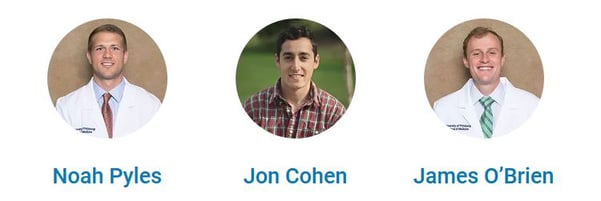The Innovation Institute's Big Idea Center for student innovation and entrepreneurship recently concluded its annual Randall Family Big Idea Competition.
 This year's competition was interrupted by the pandemic in mid-stream, but the center's staff and the students forged ahead to complete it virtually and awarded the $100,000 in prize money on April 22.
This year's competition was interrupted by the pandemic in mid-stream, but the center's staff and the students forged ahead to complete it virtually and awarded the $100,000 in prize money on April 22.
We caught up with Noah Pyles of the grand prize winning team, Polycarbin, to discuss how three medical school students became entrepreneurs and what their next steps are to bring to life their idea to reduce the amount of biomedical waste that ends up in landfills or incinerated.
As you were studying to be doctors, when did you realize you also wanted to be entrepreneurs?
We did not necessarily set out to become entrepreneurs, rather, we came to medical school and pursued science to analyze, understand and solve problems. The biomedical plastic crisis happens to be an enormous problem that we have contributed significantly to, and we think we have developed a solution.
As training physician scientists with 20 years of combined laboratory research experience, we have learned that important discoveries are often born of simple questions. Last summer, the three of us were discussing our respective research projects and the topic of biomedical plastic waste came up--”what happens to all that plastic we use?” After an appraisal of our own laboratory waste streams and additional market research, we were shocked by the extent to which the scientific community is dependent on single-use plastics. Our curiosity evolved into a moral imperative as we discovered the environmental and public health consequences of the biomedical plastic lifecycle.
At first, we wanted to develop a small scale way to recycle laboratory plastics to create a more sustainable research environment at Pitt. We quickly realized, however, the enormity of the problem required a scalable solution. We came to the conclusion that the only way to fix the biomedical plastic crisis was to show the scientific community and the industrial producers of these products that it wasn’t just more environmentally responsible to recycle these materials, but more financially responsible as well.
Polycarbin is a software-enabled sustainability company that will give the scientific community the first real opportunity to recycle biomedical plastics and reduce the carbon footprint of innovation.
What value did you get out of participating in the Randall Family Big Idea Competition (RFBIC)? What are your key learnings from the experience?
The RFBIC was an excellent opportunity to pressure test our idea, practice public speaking, and develop and refine communication skills to help our company grow in the future. Feedback from mentors like Babs Carryer and Don Morrison provided unique insights into the world of entrepreneurship that we could not have discovered on our own.
One of the most important of these lessons was how to condense a business model into a 1 minute elevator pitch and a 7 minute presentation. Influenced by our research background, we initially struggled to triage information --instinctively wanting to share all of our environmental data with anyone who would listen. Conversations with mentors like Babs and Don helped us tailor each pitch to the specific audience based on their interests and level of expertise. This is an invaluable skill which we will apply throughout our careers.
What are the next steps for your team and how will the winnings be applied?
With our $25,000 cash prize, Polycarbin will begin a paid pilot study with one of our corporate partners to prove that we can segregate highly valuable biomedical plastic from the regulated medical waste (RMW) stream and turn it back into recycled laboratory products. Once we have demonstrated that this technical aspect of our company is feasible, we will begin raising a series A round to prove that this business model can scale. The RFBIC cash prize will go directly to the development of our minimum viable product (MVP) software platform for monitoring and maintaining the purity of our plastic waste streams. This MVP will be crucial for demonstrating the scalability of our business model.
For Pitt students with an innovation derived from sponsored Pitt research, or students who are unaffiliated with a Pitt lab but would like to explore the commercial translation of a Pitt research discovery, the application deadline to apply for the Pitt Ventures Student Challenge is May 15, 2020.
